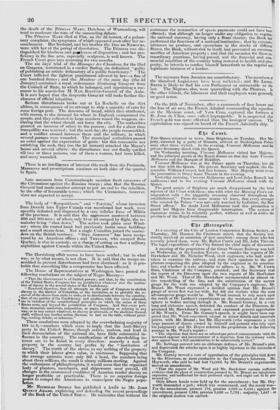The Harrisburg affair seems to have been settled ; but
in what way, or by what means, is not clear. It is said that the troops as- sembled to prevent disturbances bad been dismissed : so it is pro- bable that something like a compromise has been effected.
The House of Representatives at Washington have passed the following resolutions on the subject of Negro Slavery- " That the Government is of limited powers; and that, by the constitution of the United States, Congress has no jurisdiction whatever over the institu- tion of slavery in the several states of the Confederacy. " Resolved, therefore, that all attempts on the part of Congress to abolish slavery in the district of Columbia, or the territories, or to prohibit the re- i moval of the slaves from state to state, or to discriminate between the constitu-
tion m on of one portion of the Confederacy and another, with the views aforesaid, are in violation of the constitutional principles on which the union of these States rests, and beyond the jurisdiction of Congress. And that every peti- tion, memorial, resolution, proposition, or paper, touching or relating in any way, or to any extent whatever, to slavery as aforesaid, or the abolition thereof, shall, without any further action thereon, be laid on the table, without print- ing, reading, debate, or reference."
These resolutions were adopted by the overwhelming majority of 198 to 6,—numbers which seem to imply that the Anti-Slavery party in the United States, though active, zealous, and loud in their denunciation of the national sin, have little substantial in- fluence in the country. The ramifications of the slaveholding in- terest are to be found in every direction : scarcely a man of property in the country but profits by the " institution of slavery." The worth of the slaves, to say nothing of the property to which their labour gives value, is enormous. Supposing that the average estimate were only 301. a head, the numbers being about three millions, the result is ninety millions sterling. Against the enthusiasm of philanthropists, it would seem that the organized body of planters, merchants, and shipowners must prevail, till ehanges in the economical condition of America render slavery no longer profitable or practicable. There is no superior foreign power to compel the Americans to emancipate the Negro popu- lation.
Mr. NICHOLAS BIDDLE has published a letter to Mr. Joule Altinvcir ADAMS, explaining and defending the recent proceedings of the Bank of the United. States. He maintains that without his assistance the restoration of specie payments could not have been effbcted; that although no longer under any obligation to regulate the national currency, having only a State charter, the Bank had performed the functions of a national institution ; that by extensive advances on produce, and operations in the stocks of different States, the Bank, without risk to itself, bad prevented an enormous sacrifice of American property ; and that the occasion for these en. traordinary exertions, having passed, and the financial and conk. mercial condition of the country being restored to health and pros. perity, he intends to confine himself henceforth to the regular and kgitimute business of a banker.


























 Previous page
Previous page